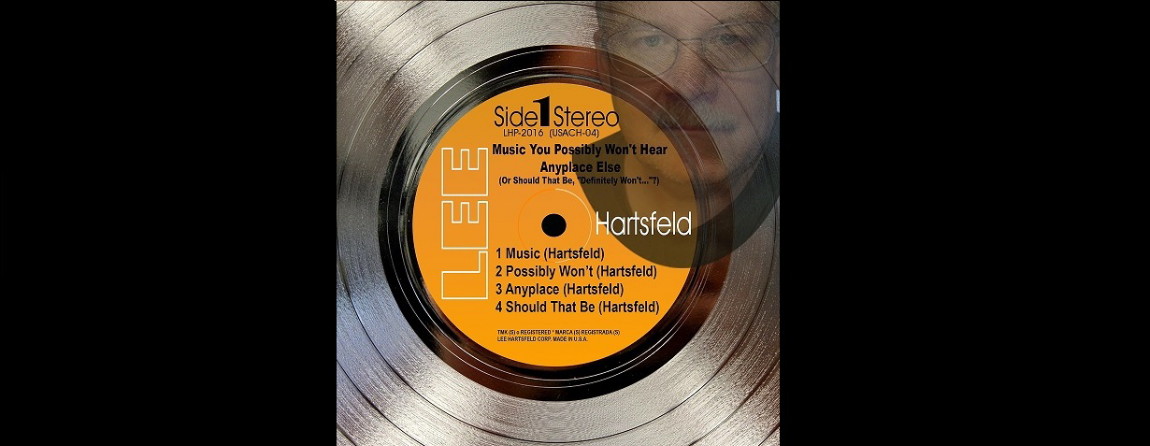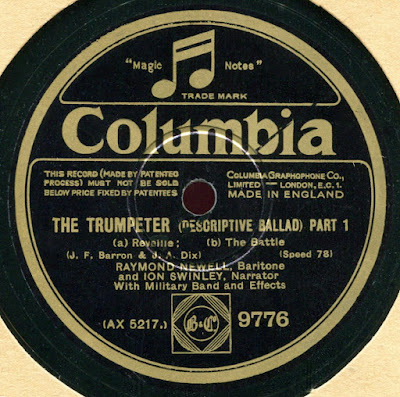Turn the lights down low, huddle closely together on this chilly Halloween night, and quiver with terror as you listen to these MY(P)WHAE classics! Or giggle with amusement (whichever works). These are the Halloween tracks that never die at this blog. Maybe that's because I keep featuring them. Yeah, that would explain it.
David Rose's wonderful
Satan and the Polar Bear (Satan and the polar bear??), from 1954, is a thousand times more effective, to my ears, than the cliched dreck that functions as scary background music nowadays. There, I said it. It anticipates the manic, in-your-face spook-music tradition of our time, but, as originals often manage to be, it's way better than the stuff it inspired.
The two
Addams Family renditions are adorable, with the vivid stereo of the De Vol version a treat for the ears. (I think I ripped it off of my old Dual 1000-series turntable.) And, after umpteen plays,
Sinner's Train remains an astonishingly well crafted, well performed, and well recorded track--and it's from the guy (Art Mooney) who gave us the 1947 smash hit version of
I'm Looking Over a Four Leaf Clover! That may be the scariest thing about it....
Cross-dressing British comic Douglas Byng's 1963 re-recording of
I'm a Mummy is a masterpiece--not of horror, but of sophisticated wit. Sophisticated wit doesn't happen very often at Halloween, so be grateful.
King Kong and
It's About Time are two TV themes of the sixties, and the latter--a comedy about astronauts who end up back in the Stone Age--was a big hit with me and my brother when it first aired. (Not enough to keep it on, unfortunately.)
They're Coming to Tow Me Away is a wonderful BP ad that aired during the winter of 1997. It almost, but not quite, makes up for the BP ads to come.
John Logan's
Dinner with Drac is a cheap knock-off of the 1958 John Zacherle hit, and just about as unfunny. The late 1950s, by the way, seems to have been the period when the monsters of Universal Studios emerged as Halloween icons, and no doubt TV reruns of
Dracula,
Frankenstein, etc. were the reason. Hence, horror host Zacherle scoring a hit record (and John Logan copying it, and pretty well).
Relatively recent history. And you was there!
Lookout Mountain, with its lyrics about voodoo and corpses rising from the swampland, remains one of the weirdest records of its type (whatever that may be). Is this a cover of an original, I wonder? Also, did the husband, in fact, rise from the swampland and find the hopeless lovers on Lookout Mountain? And if they knew he was coming to Lookout Mountain, why didn't they arrange to be somewhere else?
The lyrics don't stand up to logical analysis.
The H Man is a one-sided 1958 "Theatre Lobby Spot" 78 with two bands, both identical. I combined the best audio from both for this rip. The narration is beyond hilarious. The synthesizer effects in the background, on the other hand, are awesome.
Torero is Julius La Rosa's cover of an Italian novelty mega-hit by Renato Carosone, and though not nearly as quirky, it's well sung and accompanied with spirit, and it's a great addition to the Men in White genre.
Just click on the slaylist titles...
SLAYLISTS
HALLOWEEN CLASSICS, Part 1
Satan and the Polar Bear (Rose)--David Rose and His Orchestra, 1954
The Addams Family (Mizzy)--Frank De Vol, 1965
Sinner's Train--Art Mooney, His Orchestra and Chorus, 1956
I'm a Mummy--Douglas Byng, 1963
King Kong--Wade Denning and the Port Washingtons, 1966
It's About Time--Wade Denning and the Port Washingtons
Whatever Happened to Baby Jane--Music By De Vol, 1962
Elemtary, My Dear Watson (Indelli)--William Indelli and His Orch., 1960
Lookout Mountain--Chuck Miller
Sittin' By Sittin' Bull (Driftwood)--Eddy Arnold, 1959
Haunted House Polka--The Cavaliers, date unknown
The H Man (Theater Lobby Spot, 1958)
They're Coming to Tow Me Away (1997 BP commercial)
Sweeney Todd the Barber--Stanley Holloway, 1956
Journey Into Space--Frank Weir and His Saxophone, w. His Chorus and Orch., 1955
The Horror Show--Sharkey Todd and His Monsters, 1959
HALLOWEEN CLASSICS, Part 2
Hooray, Hooray, I'm Goin' Away (S. Skylar)--Beatrice Kay, w. Mitchell Ayres O., 1947
I Love Him So Much (I Could Scream)--Peggy Lloyd w. Nick and His Gang, 1950
Hush... Hush, Sweet Charlotte--Lawrence Welk
Mr. Ghost Goes to Town--Five Jones Boys (1936)
Addams Family--Lawrence Welk and His Orch., 1965
Torero--Julius La Rosa, 1958
The Merry Ghost from Chatham Square--Henry Rene Musette Orch., w. vocal, 1942
Dinner with Drac--John Logan (Promenade 34)
The Cool Gool--Sharkey Todd and His Monsters, 1959
I Died All Over You--Bud Messner and His Sky Line Boys, v: Bill Franklin, 1950
Robot Man--Jamie Horton (Gayla Peevey), 1960
Little Monster--The Baker Sisters w. Hugo Peretti O.
Hypnotized--Ted Fio Rito and His Orch, v: Fuzzy Marcellino, 1936
It's Witchery (Tobias)--Charles Spivak and His Orch., v: Tommy Mercer, 1947
Big Bad Wolf (Bartel)--Don Cherry w. Ray Conniff Orch., 1958
Good-byyyyyyyyye!!!
Lee


















































